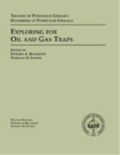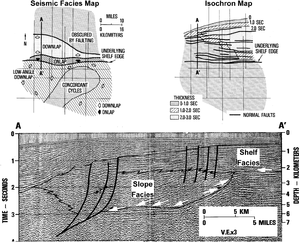Difference between revisions of "Seismic facies mapping"
Jump to navigation
Jump to search
FWhitehurst (talk | contribs) |
FWhitehurst (talk | contribs) |
||
| Line 25: | Line 25: | ||
|- | |- | ||
| 1 | | 1 | ||
| − | | Identify sequences that contain potential | + | | Identify sequences that contain potential [[trap]]s, [[Seal capacity of different rock types|seal rocks]], [[Reservoir quality|reservoir rocks]], or [[source rock]]s. |
|- | |- | ||
| 2 | | 2 | ||
| − | | Make regional seismic reflection pattern maps and isochron maps of those sequences. If possible, make maps of lowstand, transgressive, and highstand systems tracts. | + | | Make regional seismic reflection pattern maps and isochron maps of those sequences. If possible, make maps of [[Sea level cycle phase and systems tracts#Lowstand systems tracts|lowstand]], [[Sea level cycle phase and systems tracts#Transgressive systems tracts|transgressive]], and [[Sea level cycle phase and systems tracts#Highstand systems tracts|highstand systems tracts]]. |
|} | |} | ||
Revision as of 13:37, 2 May 2014
| Exploring for Oil and Gas Traps | |

| |
| Series | Treatise in Petroleum Geology |
|---|---|
| Part | Predicting the occurrence of oil and gas traps |
| Chapter | Exploring for stratigraphic traps |
| Author | John C. Dolson, Mike S. Bahorich, Rick C. Tobin, Edward A. Beaumont, Louis J. Terlikoski, Michael L. Hendricks |
| Link | Web page |
| Store | AAPG Store |
Seismic facies maps show the areal distribution of seismic facies and are useful when making lithofacies interpretations. The most common and useful parameters to be mapped are seismic reflection patterns and isochrons (thickness measured in seconds of two-way time).
Procedure
The table below outlines a suggested procedure for mapping seismic facies.
| Step | Action |
|---|---|
| 1 | Identify sequences that contain potential traps, seal rocks, reservoir rocks, or source rocks. |
| 2 | Make regional seismic reflection pattern maps and isochron maps of those sequences. If possible, make maps of lowstand, transgressive, and highstand systems tracts. |
Example
Figure 1 contains examples of a seismic facies map, an isochron map, and seismic line A–Á (location shown on maps).
See also
- Facies analysis
- Basics of seismic facies analysis
- Reflection configuration patterns
- Analyzing individual reflectors
- Techniques for enhancing seismic facies analysis
- Analyzing lithofacies
- Petrophysical analysis of lithofacies
